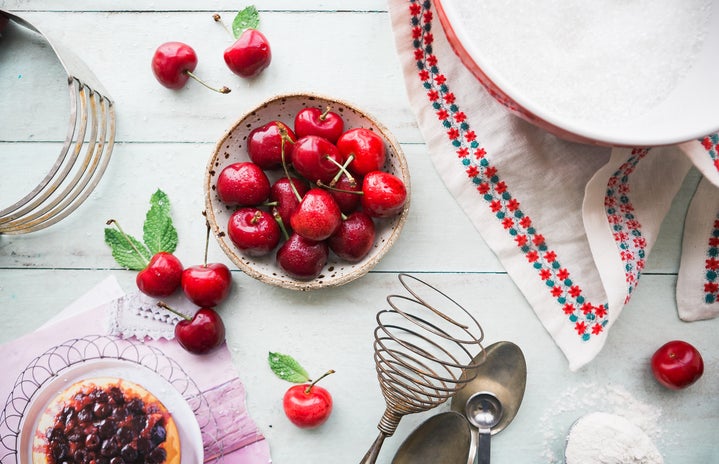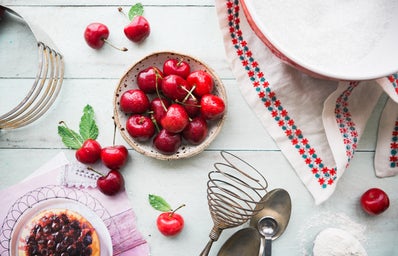University is a time of self-discovery when it comes to food. For some, this may entail discovering just how many days in a row you can eat frozen pizza. For others, the shift from a fridge stocked by their parents to being wholly responsible for the food they eat can be a great opportunity to question their previous diet and implement new eating habits. For me, this was the perfect time to become vegetarian, and eventually (mostly) vegan.
Whether you are a soon-to-be vegetarian, a long-time vegan, or someone who just wants to reduce their meat consumption, below are a few lessons I have learned that will help you to feel great about your eating habits and to cook amazing food.
1. Vegetarian/vegan does not mean healthy… it still takes work!
Many people assume that because you are vegetarian or vegan that you are healthy. Let’s be real, you can be vegetarian and still live off pizza pops. Try not to fall into the trap of living off unhealthy comfort foods, or worse yet, fake meat products. There can be many wonderful health benefits to reducing meat consumption, try to take advantage of them if you can! If you are interested in more information about the health effects of a plant-based diet, The China Study by T. Colin Campbell is a great resource.
2. Use social media and blogs for cooking inspiration
There are incredible people creating drool-worthy vegetarian and vegan food on a variety of platforms such as Instagram, Youtube, and various blogs. Take advantage of these free resources to find great recipes and to learn more about cooking, generally. Here are my favourties:
@erinireland: Erin posts informal cooking videos on her Instagram story almost daily and archives each recipe story on her profile. These videos are informative, helpful, and fun to watch! Beware—Erin’s stories will make you want to visit Vancouver, if not for the food then for the beautiful scenery.
YouTube
Lauren Toyota is the queen of vegan comfort food. Her Youtube channel features recipes such as vegan nacho cheese (trust me it’s delicious), vegan cinnamon rolls, and a vegan buffalo cauliflower sandwich, to name a few.
Deliciously Ella posts a new vegan-friendly recipe every Sunday. Her videos are short, beautifully shot, and cover a wide variety of meals.
Not only are Rose’s videos great for anyone who describes their cooking style as cheap and or/lazy, she also posts videos that are generally helpful to anyone contemplating a vegan diet, with videos discussing topics such as mistakes to avoid when going vegan and eating out as a vegan. This is also a great YouTube channel for vegan Asian food.
Blogs
This is the GOAT (greatest of all time) of all cooking blogs. All the recipes require 10 ingredients or less, 1 bowl, or are 30 minutes or less to prepare. The recipes are accompanied by easy-to-follow instructions and stunning photos (and sometimes videos). This blog is also a great place for recipes for those looking for gluten-free, grain-free, or oil-free recipes. Below are photos of my attempts at making the Minimalist Baker recipes for vegan berry pop-tarts and vegan green chili mac ‘n’ cheese (both turned out amazing!).
Oh She Glows: Angela’s Liddon’s blog and cookbook (with the same name), got me through my first year as a vegetarian and I can’t recommend them enough. Her recipes are not only delicious but usually healthy and free from processed foods—they will truly help you to glow from the inside out. The Oh She Glow’s chickpea salad recipe is particularly great for school lunches.
3. Make some investments in your kitchen
Cutting meat out of your diet can reduce your grocery bill. Keeping that in mind, I encourage you to make two investments in your kitchen to help you cook vegetarian or vegan food—a food processor and a comprehensive spice cupboard. A food processor greatly expands the recipes you can cook and helps mitigate reliance on processed foods. Similarly, vegetarian and vegan recipes can call for a daunting number of spices, and the challenge of buying them all at once to cook a single recipe can be off-putting. Try to buy essential spices at the beginning of your diet change and before you know it you’ll find that you have a diverse set of spices in your cupboard that will make it easy to whip up any recipe you choose. Your local bulk food store can be a cheap source for spices and allows you to buy spices in small quantities.
4. Other people will take your decision personally
Even if you have zero judgment for people who choose to eat meat, they will judge you. There will be some people in your life who will be unsupportive of your decision and take it personally. Whether it is a family member telling you they won’t accommodate your dietary restriction, a significant other upset that you can’t eat your usual takeaway together, or a server at a restaurant being annoyed when you make a substitution… it will happen! It may be hard at first, but don’t apologize for your decision-people will become more comfortable with your decision over time, just as you will get better at dealing with those people.
5. Don’t be afraid to take it slow
Changing your diet doesn’t have to be an overnight thing—do your research and make the transition at your own pace. It is important to go easy on yourself and choose the diet that suits you best. For example, I tried to go from a vegetarian (who was obsessed with cheese) to a strict vegan in a day. Long story short, I failed. The drastic change affected my mood (I’m pretty sure I went through cheese withdrawals) and my social life. I was a person who ate out constantly with my friends and significant other, and while you can do that as a vegan, I didn’t know how and that was very difficult. The failure didn’t deter me from becoming vegan, but it did cause me to take a step back and adopt a more gradual approach. It is okay to slip up; what’s important is that you try again, perhaps with some adjustments.


